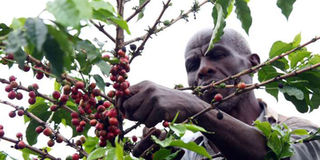State needs to get out of the lives of coffee farmers so they can prosper

A farmer harvesting coffee berries at his farm in Muranga County. The government should retain only those regulations that protect coffee farmers from exploitation and guarantee the quality of coffee and the safety of farm inputs. PHOTO | EVANS HABIL | NATION MEDIA GROUP
What you need to know:
- I am convinced that we can help the country a great deal if we can quickly improve our export earnings.
- The government should retain only those regulations that protect farmers from exploitation and guarantee the quality of coffee and the safety of farm inputs.
- Coffee mills should be owned by farmers who need to be helped to manage them, possibly by county governments. This will eliminate theft of coffee by millers.
In my youth, I was a student of Mao Tse Tung (or Mao Zedong).
In one of his biographies, I read that he believed in inscrutable, detached, unresponsive composure. But sometimes you just have to explain yourself.
Two weeks ago, I took some time off paying bills and driving a desk, got a crap Rav 4, and drove out into the country to see a coffee factory in Murang’a.
I took with me my junior colleague and protégé, Mr Denis Galava, a journalist of great ability and promise.
Other than being as argumentative and stubborn as a Malaba mule and as cunning as a Kalahari mongoose — qualities shared by all good reporters — Galava is a reasonably good travel companion.
We wanted to start the coffee journey from the tree, through the factory, and all the way to the cup.
For me this was like walking through a hall of memories from my childhood.
When my father was freed from detention by the colonial government those many years ago, one of the first things he did was to plant coffee.
I tend to view my father’s generation’s passion for coffee as an extension of the psychology of liberation.
The white man did not allow them to grow it, or they were allowed to grow only a few trees, or they were considered too stupid to produce a good crop, so for them growing what was hitherto the preserve of the colonial lord was a way of saying: Hello, we are human, we can do it too.
IMPROVING EXPORT EARNINGS
I think there was an over-abundance of optimism in the 1960s and 1970s.
What the 1980s proved was that our capacity to mess things up was probably greater than we initially gave ourselves credit for.
And our management of coffee is a very good case study of how not to run public affairs.
We no longer grow coffee where I come from, so this is not about me doing the old folk back home a favour.
It is about millions of Kenyans who have sunk into poverty and who can have a decent income if the government can get out of their lives.
It pains me when I see containers being driven upstream laden with goods but going back empty.
I also panicked when a friend of mine was trying to convince me that Kenya will in the near future need a Greek-type IMF mission to restructure its debt.
I am convinced that we can help the country a great deal if we can quickly improve our export earnings.
It will buy us some space to deal with the galloping expenditure and waste in government.
President Uhuru Kenyatta should order an inquiry into the management of coffee with a view to identifying and holding to account regulators, managers, and business people who have been involved in what constitutes a terrible crime against the farmers of Kenya.
There must be a way of fining the companies that have unfairly benefited from the slavery of Kenyans.
Opposition leader Raila Odinga should also pick up the issue and make the case for the economy and those farmers.
COFFEE CARTELS
Secondly, coffee farmers are not enemies of the State.
There is no need to regulate their affairs so tightly.
The government should retain only those regulations that protect farmers from exploitation and guarantee the quality of coffee and the safety of farm inputs.
Otherwise, coffee should be treated just like any other crop.
Thirdly, we should put money into coffee mills all over the country.
They should be owned by farmers who need to be helped to manage them, possibly by county governments. This will eliminate theft of coffee by millers.
Finally, Kenya should have a modern, fair commodity exchange to guarantee the best possible return for the farmer.
If we cannot do it on our own, let us call in the Ethiopians.
The coffee cartel is very powerful and wealthy. It is certainly fighting back with every dirty trick in the book.
But the mule of Malaba, I, and a battery of good Daily Nation journalists and editors have dug in and we insist: please do something about this issue.
Farmers have as much right to an income as the cartel. Live and let live. To misquote Chairman Mao, “let a hundred coffee flowers bloom.”
*****
An African proverb to light up your weekend: Only after you have safely crossed the river can you say the crocodile has a lump on his snout.





